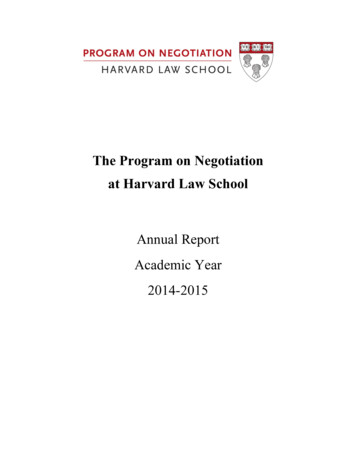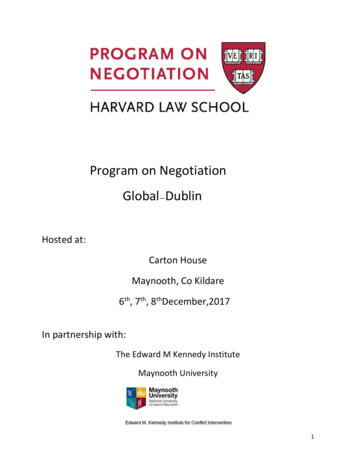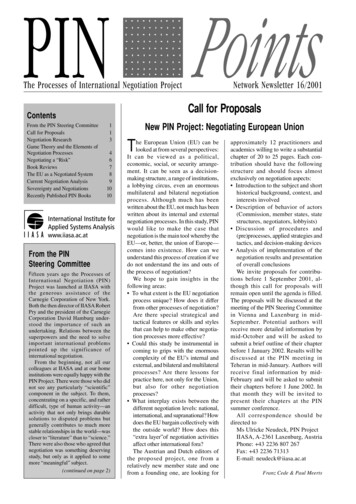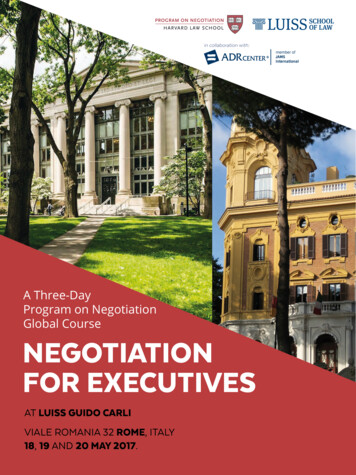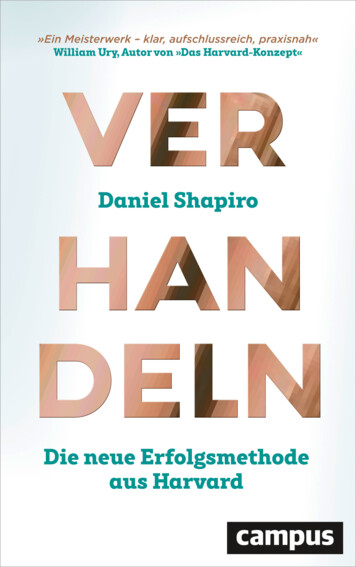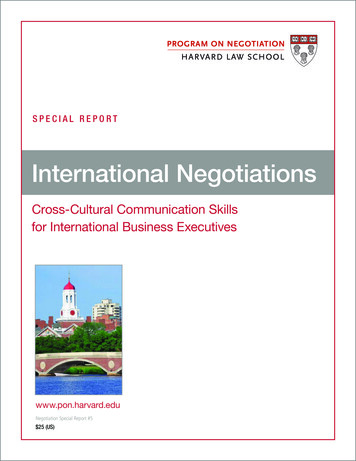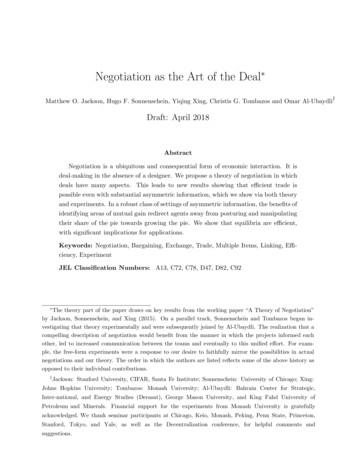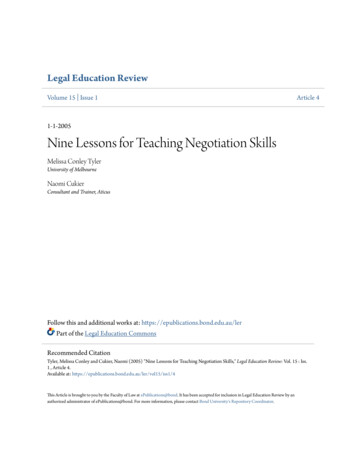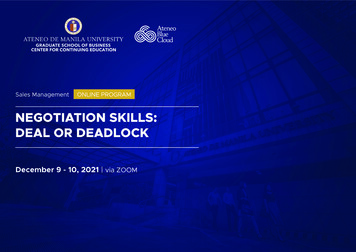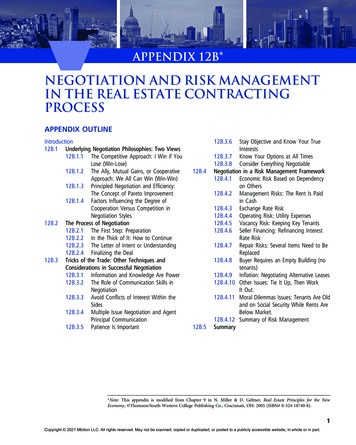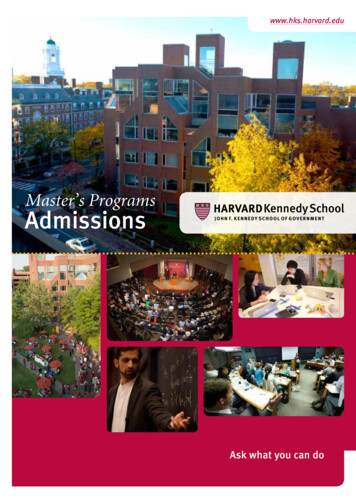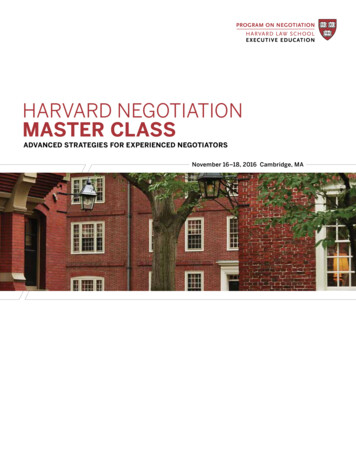
Transcription
HARVARD NEGOTIATIONMASTER CLASSADVANCED STRATEGIES FOR EXPERIENCED NEGOTIATORSNovember 16–18, 2016 Cambridge, MA
November 2016Dear Program Participant,We are delighted to welcome you to the Harvard Negotiation Master Class.We want this to be a practical and worthwhile educational experience for you and havedesigned it – through the use of negotiation simulations and special exercises – to maximizeyour participation.Among the materials in this binder, you will find: An agenda PON Code of Conduct Book Table Info Biographical information on our faculty A set of presentationsAdditional program materials will be distributed to you throughout the session.We’d like to make sure you continue to be part of our growing community, so we invite you tostay connected through our LinkedIn Group, Twitter feed and Facebook pages. Facultymembers offer advice, and course participants network and discuss relevant topics and keepup-to-date on PON Executive Education.If there is any way in which we can be helpful to you, please don’t hesitate to ask. Thank you forjoining us for what we hope will be a most valuable and productive event.Cordially,Robert H. MnookinSamuel Williston Professor of Law andChair, Program on Negotiation at Harvard Law SchoolP.S. Please remember to complete your evaluation of the course and collect yourCertificate of Completion.1
Harvard Negotiation Master ClassAGENDANov. 16-18, 2016Wednesday Evening Location (Nov. 16): Harvard Faculty Club20 Quincy St., Cambridge, MAMain location (Nov. 17-18): The Charles Hotel1 Bennett St., Cambridge, MAWednesday, Nov. 165:00 – 6:45 p.m.Registration5:30 – 6:45 p.m.Welcome Reception6:45 – 7:30 p.m.Welcome and Overview – Jared Curhan, Francesca Gino, GuhanSubramanian, Larry Susskind7:30 – 8:30 p.m.DinnerThursday, Nov. 177:30 a.m. – 8:30 a.m.Breakfast8:30 a.m. – 9:00 a.m.Opening Session – Jared Curhan, Francesca Gino, GuhanSubramanian, Larry Susskind9:00 a.m. – 12:30 p.m.Analyzing Objective and Subjective Value in Negotiation – JaredCurhan12:30 p.m. – 1:30 p.m.Luncheon1:30 p.m. – 5:00 p.m.Dealing with the Toughest Questions: Anticipating andResponding Effectively – Guhan Subramanian5:15 p.m.Dinner3
Friday, Nov. 177:30 a.m. – 8:30 a.m.Breakfast8:30 a.m. – 12:00 p.m.Uncovering and Overcoming Bias at the Negotiation Table –Francesca Gino12:00 p.m. – 1:00 p.m.Luncheon1:00 p.m. – 4:10 p.m.Building a World-Class Negotiating Organization – LawrenceSusskind4:10 p.m. – 4:30 p.m.Synthesize Learnings and Wrap Up – Jared Curhan, FrancescaGino, Guhan Subramanian, Larry Susskind4:30 p.m.AdjournmentNote: Throughout the program, you will have opportunities to meet with faculty members in small groups todiscuss personal negotiation challenges and opportunities. Please note that you will have the opportunity to meetwith a faculty member over two meals of the program. Please make yourself available for all meals until such timethat we provide you your schedule of working groups.
Introductory Materials5
Participant Code of ConductWe extend a warm welcome to our community of learners!The Program on Negotiation (PON) is a consortium program of Harvard University, the MassachusettsInstitute of Technology, and Tufts University. PON’s mission includes helping individuals become moreeffective negotiators, providing a forum for the discussion of ideas, and nurturing the next generation ofnegotiation teachers and scholars.As a consortium of local institutions, we support our Universities’ missions to foster safe and respectfulenvironments in which to work and learn. Since PON brings together a diverse group of individuals for ashort time, the guidelines we describe below are intended to establish community norms, communicatethe standards of our consortium Universities, and outline our expectations.Attendance and ParticipationOur programs are highly interactive. A hallmark of our programs is the use of negotiation simulationsand activities; we will place you in pairs or in small groups to engage in activities at regular intervalsthroughout the program. We expect participants to: Attend all sessions in order to ensure the learning of each individual, pairing, and group. In ourprograms that provide certificates of completion, participants must have attended all sessions toreceive a certificate. Refrain from email correspondence, text messaging, and other personal activities during classsessions, except in an emergency.English ProficiencyWe expect that all participants will be fully conversant in English. Should you encounter a context orsituation in the classroom that puts you ill at ease in English, please speak to the PON program managerso that we may make appropriate adjustments.Consideration of Intellectual PropertyParticipants are prohibited from video and/or audio recording, or photographing any portion of theprogram content. All program materials are owned or licensed to PON by the authors and are copyrightprotected. All of these materials are shared with participants for their personal use only.If PON plans to film or record any program activities, PON will inform participants and seek permission.ProfessionalismAll individuals are expected to demonstrate respect for each person’s worth, dignity, and capacity tocontribute. Disrespectful or intolerant behavior and sexual harassment are unacceptable. If you are subject to inappropriate behavior we ask that you notify the PON program managerimmediately. PON takes its obligation to provide a safe and professional environment for everyonevery seriously.7
ConfidentialityOur programs are designed to promote professional growth and personal reflection. We ask that yourespect the privacy of all participants and any sensitive information you may obtain while working withand learning from your program colleagues.GuestsSince we strive to foster the development of a tight-knit community of peers, participation in theclassroom, academic activities, and meals is limited to enrolled program participants only. Guests maybe invited to social functions.Representing your Harvard ExperienceYou may want to describe your experience at Harvard in your biography, curriculum vitae, LinkedInprofile, or within your organization. You are welcome to say that you attended or participated in aProgram on Negotiation at Harvard Law School Executive Education course. It is not appropriate to saythat you studied at Harvard/MIT/Tufts without qualifying the experience as an Executive Educationcourse. Although you will receive a Certificate of Completion for your full attendance in one of ourcourses, it is not appropriate to characterize yourself as Harvard/MIT/Tufts trained or certified.Thank you. Your contribution to others’ learning and growth is appreciated by the PON community.Your participation is greatly valued and we look forward to a vibrant and engaging program.
Book TableThe Program on Negotiation’s Teaching Negotiation Resource Center offers a booktable where Harvard Negotiation Master Class participants may order books writtenby our faculty and other experts in negotiation.Please note that participants will receive copies of Dealmaking: The New Strategyof Negotiauctions by Professor Subramanian, Sidetracked: Why Our DecisionsGet Derailed, and How We Can Stick to the Plan by Professor Gino, and Built toWin: Creating a World-class Negotiating Organization by Professor Susskind andHallum Movius.HoursLuke Adolph, from the Teaching Negotiation Resource Center, will be on site from 7:00to 9:00 a.m. on Thursday and Friday. Participants may submit their orders and speakwith him during those times.Ordering BooksOrders submitted in person or phone by 2:30 p.m. on Thursday will be available forpick-up at the book table the following day.Orders can also be shipped. Shipping and handling charges apply, and the Centerrepresentative can discuss these with you.Orders can also be placed online at www.pon.org. These orders will be shipped to theaddress you supply.QuestionsFor questions, please speak to the Center representative when he is on site, call 781966-2751, or email tnrc@law.harvard.edu.9
Jared CurhanJared R. Curhan is the Sloan Distinguished Associate Professor of Organization Studies atMIT's Sloan School of Management, where he specializes in the psychology of negotiation andconflict resolution. He received his BA in Psychology from Harvard University and his MA andPhD in Psychology from Stanford University. A recipient of support from the National ScienceFoundation, Curhan has pioneered a social psychological approach to the study of "subjectivevalue" in negotiation (i.e., social, perceptual, and emotional consequences of a negotiation). Hiscurrent research uses the Subjective Value Inventory (SVI), a measure he developed, toexamine precursors, processes, and long-term effects of subjective value in negotiation.Curhan serves on the Executive Committee of the Program on Negotiation at Harvard LawSchool. Deeply committed to education at all levels, Curhan received Stanford University'sLieberman Fellowship for excellence in teaching and university service, as well as MIT'sinstitute-wide teaching award and MIT Sloan's Jamieson Prize for excellence in teaching.Curhan is Founder and President of the Program for Young Negotiators, Inc., an organizationdedicated to the promotion of negotiation training in primary and secondary schools. His book,Young Negotiators (Houghton Mifflin, 1998), is acclaimed in the fields of negotiation andeducation and has been translated into Spanish, Hebrew, and Arabic. The book has been usedto train more than 35,000 children across the United States and abroad to achieve their goalswithout the use of violence.11
Guhan SubramanianGuhan Subramanian is the Joseph Flom Professor of Law and Business at Harvard Law School(HLS) and the Douglas Weaver Professor of Business Law at Harvard Business School (HBS).Professor Subramanian is the first person in the history of Harvard University to hold tenuredappointments at both HLS and HBS. At HLS, he teaches courses in negotiation and corporatelaw. At HBS, he teaches several executive education programs, including StrategicNegotiations, Changing the Game, Managing Negotiators and the Deal Process, and MakingCorporate Boards More Effective. He is the faculty chair for the JD/MBA program at HarvardUniversity and the Vice Chair for Research at PON. Prior to joining the Harvard faculty, he spentthree years at McKinsey & Company.Professor Subramanian’s research explores topics in corporate governance and negotiation. Hehas published articles in the Stanford Law Review, the Yale Law Journal, the Harvard BusinessReview, and the Harvard Law Review, among other places. His recent book, Dealmaking: TheNew Strategy of Negotiations, synthesizes the findings from his research and teaching over thepast decade. This book has been translated into Chinese (Mandarin), German, Japanese,Portuguese, and Spanish. He is also co-author of Commentaries and Cases on the Law ofBusiness Organization, a leading textbook in the field of corporate law.Professor Subramanian has been involved in major public-company deals, such as Oracle’s 10.3 billion hostile takeover bid for PeopleSoft, Cox Enterprises’ 8.9 billion freeze-out of theminority shareholders in Cox Communications, the 6.6 billion leveraged buyout of Toys “R” Us,and Exelon’s 8.0 billion hostile takeover bid for NRG. He also advises individuals, boards ofdirectors, and management teams on issues of dealmaking and corporate governance. Over thepast 10 years he has been involved as an advisor or expert witness in deals or situations worthover 100 billion in total value.
Francesca GinoFrancesca Gino is the Tandon Family Professor of Business Administration in the Negotiation,Organizations & Markets Unit at Harvard Business School. She is also formally affiliated withthe Program on Negotiation at Harvard Law School, with the Mind, Brain, Behavior Initiative atHarvard University, and with the Behavioral Insight Group at Harvard Kennedy School.Professor Gino teaches Decision Making and Negotiation in the MBA elective curriculum and inExecutive Education programs at the School. She co-chairs an HBS Executive Educationprogram on applying behavioral economics to organizational problems. She also teaches a PhDcourse on Behavioral Approaches to Decision Making, a PhD course on Experimental Methodsand one on Micro Topics in Organizational Behavior.Professor Gino has won numerous awards for her teaching, including the HBS Faculty Awardby Harvard Business School’s MBA Class of 2015 and the 2015 Charles M. Williams Award inrecognition of remarkable teaching in the MBA Program, and for her research, including the2013 Cummings Scholarly Achievement Award, from the Academy of ManagementOrganizational Behavior Division. In 2015, Francesca was chosen by Poets & Quants to beamong their "40 under 40", a listing of the world's best business school professors under theage of 40.Professor Gino’s research focuses on judgment and decision-making, negotiation, ethics,motivation, and productivity. Her work has been published by academic journals in bothpsychology and management, as well as in numerous book chapters and practitioner outlets.Her studies have also been featured in The Economist, The New York Times, Newsweek,Scientific American, Psychology Today, and The Wall Street Journal, and her work has beendiscussed on National Public Radio and CBS Radio.In addition to teaching, Professor Gino advises firms and not-for-profit organizations in the areasof negotiation, decision-making, and organizational behavior.Professor Gino is the author of Sidetracked: Why Our Decisions Get Derailed and How We CanStick to the Plan (HBR Press, 2013).13
Lawrence SusskindLawrence E. Susskind has been a professor at Massachusetts Institute of Technology for morethan 35 years. He teaches negotiation as well as a number of other advanced subjects and runsa substantial research program as Director of the MIT-Harvard Public Disputes Program(http://web.mit.edu/publicdisputes). He has supervised more than 60 doctoral students who nowwork around the world in academia, government and the private sector.Professor Susskind is one of the founders and directors of the Program on Negotiation (PON) atHarvard Law School where he is Vice-Chair, Education, for the PON Executive Committee.Professor Susskind created the Consensus Building Institute in 1993 (www.cbuilding.org) andhas been delivering tailored learning and organizational development solutions on a worldwidebasis ever since. Through the executive training programs at PON he has offered specializednegotiation training (e.g., Technology Negotiation, Dealing with an Angry Public, TeachingNegotiation in the Corporation) to more than 40,000 people. He has published more than 70teaching simulations, a dozen teaching videos and DVDs, and is a columnist for NegotiationBriefings published at Harvard. He has been a visiting lecturer at more than 50 universities in 20countries.Recent clients include: Hewlett-Packard, Biogen-Idec, CSX Transportation, Proctor & Gamble,Reed-Elsevier, Canadian Medical Association, National Association of Pediatric Hospitals, BlueCross/Blue Shield, Eastman-Kodak, University of Michigan Health Systems, Bristol-MyersSquibb, Genentech, State Street Bank, Manitoba Hydro, J. W. Homes, Brown-Forman, NPDGroup, Stop & Shop, Siemens, AstraZeneca and WPP.Professor Susskind is the author or co-author of 20 books including Good for You, Great for Me(Public Affairs Books, 2014), Water Diplomacy: A Negotiated Approach to Managing ComplexWater Networks (RFF Press, 2012), Built to Win: Creating a World-Class NegotiatingOrganization (Harvard Business School Press, 2009), Multiparty Negotiation (Sage, 2008), andBreaking Robert’s Rules: The New Way to Run Your Meeting, Build Consensus and GetResults (Oxford University Press, 2006). He has won a number of prizes and awards including aPioneer Award from the Association for Conflict Resolution, the 2005 Distinguished EducatorAward from the Association of Collegiate Schools of Planning and the Global EnvironmentAward given by the International Association for Impact Assessment. Dealing with An AngryPublic (Free Press, 1996) and The Consensus Building Handbook (Sage, 1999), won BestDispute Resolution Book of the Year awards in 1997 and 2000 respectively.Professor Susskind received a BA from Columbia University in English Literature in 1968, aMaster of City Planning from MIT in 1970 and a Ph.D in Urban and Regional Planning from MITin 1973.
Analyzing Objective and SubjectiveValue in Negotiation15
Please note: Additional slides will be handed out after they havebeen shown in class.NotesCopyright 2016 by Jared R. Curhan. All rights reserved.17
NotesCopyright 2016 by Jared R. Curhan. All rights reserved.
NotesCopyright 2016 by Jared R. Curhan. All rights reserved.19
NotesCopyright 2016 by Jared R. Curhan. All rights reserved.
NotesCopyright 2016 by Jared R. Curhan. All rights reserved.21
NotesCopyright 2016 by Jared R. Curhan. All rights reserved.
Dealing with Their Hardest Question:Anticipating & Responding Effectivelyin the Room23
Please note: Additional slides will be handed out after they havebeen shown in class.NotesCopyright 2016 by Guhan Subramanian. All rights reserved.25
NotesCopyright 2016 by Guhan Subramanian. All rights reserved.
NotesCopyright 2016 by Guhan Subramanian. All rights reserved.27
NotesCopyright 2016 by Guhan Subramanian. All rights reserved.
NotesCopyright 2016 by Guhan Subramanian. All rights reserved.29
NotesCopyright 2016 by Guhan Subramanian. All rights reserved.
NotesCopyright 2016 by Guhan Subramanian. All rights reserved.31
NotesCopyright 2016 by Guhan Subramanian. All rights reserved.
NotesCopyright 2016 by Guhan Subramanian. All rights reserved.33
NotesCopyright 2016 by Guhan Subramanian. All rights reserved.
NotesCopyright 2016 by Guhan Subramanian. All rights reserved.35
NotesCopyright 2016 by Guhan Subramanian. All rights reserved.
Uncovering and Overcoming Biasat the Negotiation Table37
Please note: Additional slides will be handed out after they have beenshown in class.NotesCopyright 2016 by Francesca Gino. All rights reserved.39
NotesCopyright 2016 by Francesca Gino. All rights reserved.
NotesCopyright 2016 by Francesca Gino. All rights reserved.41
NotesCopyright 2016 by Francesca Gino. All rights reserved.
NotesCopyright 2016 by Francesca Gino. All rights reserved.43
Building a World‐ClassNegotiating Organization45
NotesCopyright 2016 by Lawrence Susskind. All rights reserved.47
NotesCopyright 2016 by Lawrence Susskind. All rights reserved.
NotesCopyright 2016 by Lawrence Susskind. All rights reserved.49
NotesCopyright 2016 by Lawrence Susskind. All rights reserved.
NotesCopyright 2016 by Lawrence Susskind. All rights reserved.51
NotesCopyright 2016 by Lawrence Susskind. All rights reserved.
NotesCopyright 2016 by Lawrence Susskind. All rights reserved.53
NotesCopyright 2016 by Lawrence Susskind. All rights reserved.
NotesCopyright 2016 by Lawrence Susskind. All rights reserved.55
NotesCopyright 2016 by Lawrence Susskind. All rights reserved.
NotesCopyright 2016 by Lawrence Susskind. All rights reserved.57
NotesCopyright 2016 by Lawrence Susskind. All rights reserved.
NotesCopyright 2016 by Lawrence Susskind. All rights reserved.59
NotesCopyright 2016 by Lawrence Susskind. All rights reserved.
NotesCopyright 2016 by Lawrence Susskind. All rights reserved.61
NotesCopyright 2016 by Lawrence Susskind. All rights reserved.
NotesCopyright 2016 by Lawrence Susskind. All rights reserved.63
NotesCopyright 2016 by Lawrence Susskind. All rights reserved.
NotesCopyright 2016 by Lawrence Susskind. All rights reserved.65
NotesCopyright 2016 by Lawrence Susskind. All rights reserved.
NotesCopyright 2016 by Lawrence Susskind. All rights reserved.67
NotesCopyright 2016 by Lawrence Susskind. All rights reserved.
NotesCopyright 2016 by Lawrence Susskind. All rights reserved.69
NotesCopyright 2016 by Lawrence Susskind. All rights reserved.
NotesCopyright 2016 by Lawrence Susskind. All rights reserved.71
NotesCopyright 2016 by Lawrence Susskind. All rights reserved.
NotesCopyright 2016 by Lawrence Susskind. All rights reserved.73
NotesCopyright 2016 by Lawrence Susskind. All rights reserved.
NotesCopyright 2016 by Lawrence Susskind. All rights reserved.75
NotesCopyright 2016 by Lawrence Susskind. All rights reserved.
NotesCopyright 2016 by Lawrence Susskind. All rights reserved.77
NotesCopyright 2016 by Lawrence Susskind. All rights reserved.
NotesCopyright 2016 by Lawrence Susskind. All rights reserved.79
NotesCopyright 2016 by Lawrence Susskind. All rights reserved.
NotesCopyright 2016 by Lawrence Susskind. All rights reserved.81
NotesCopyright 2016 by Lawrence Susskind. All rights reserved.
NotesCopyright 2016 by Lawrence Susskind. All rights reserved.83
NotesCopyright 2016 by Lawrence Susskind. All rights reserved.
NotesCopyright 2016 by Lawrence Susskind. All rights reserved.85
NotesCopyright 2016 by Lawrence Susskind. All rights reserved.
NotesCopyright 2016 by Lawrence Susskind. All rights reserved.87
NotesCopyright 2016 by Lawrence Susskind. All rights reserved.
Organizations & Markets Unit at Harvard Business School. She is also formally affiliated with the Program on Negotiation at Harvard Law School, with the Mind, Brain, Behavior Initiative at Harvard University, and with the Behavioral Insight Group at
